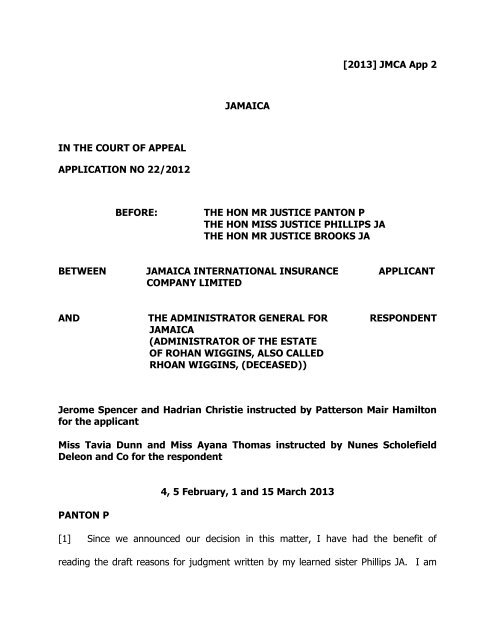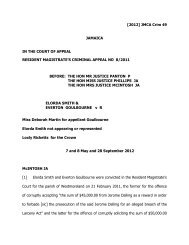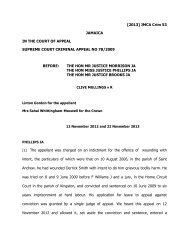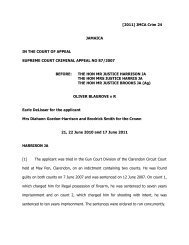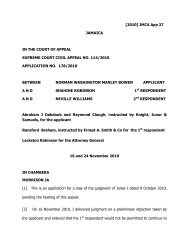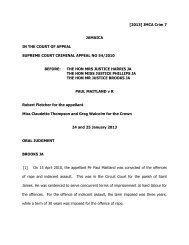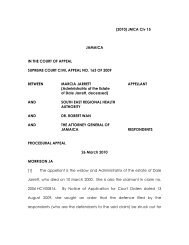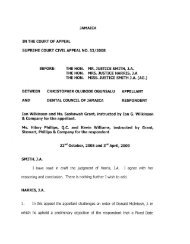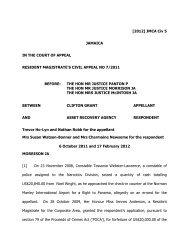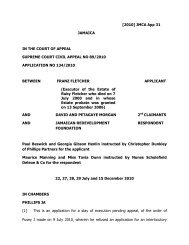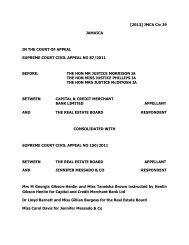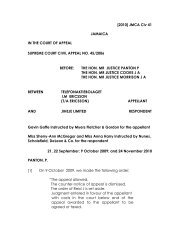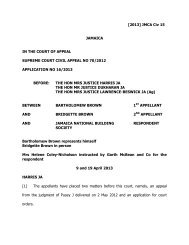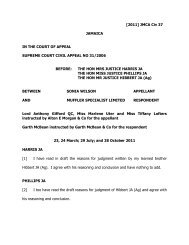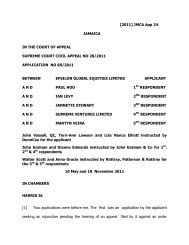Jamaica International Insurance Co Ltd v the Admin General for ...
Jamaica International Insurance Co Ltd v the Admin General for ...
Jamaica International Insurance Co Ltd v the Admin General for ...
- No tags were found...
Create successful ePaper yourself
Turn your PDF publications into a flip-book with our unique Google optimized e-Paper software.
[2013] JMCA App 2JAMAICAIN THE COURT OF APPEALAPPLICATION NO 22/2012BEFORE:THE HON MR JUSTICE PANTON PTHE HON MISS JUSTICE PHILLIPS JATHE HON MR JUSTICE BROOKS JABETWEEN JAMAICA INTERNATIONAL INSURANCE APPLICANTCOMPANY LIMITEDAND THE ADMINISTRATOR GENERAL FOR RESPONDENTJAMAICA(ADMINISTRATOR OF THE ESTATEOF ROHAN WIGGINS, ALSO CALLEDRHOAN WIGGINS, (DECEASED))Jerome Spencer and Hadrian Christie instructed by Patterson Mair Hamilton<strong>for</strong> <strong>the</strong> applicantMiss Tavia Dunn and Miss Ayana Thomas instructed by Nunes ScholefieldDeleon and <strong>Co</strong> <strong>for</strong> <strong>the</strong> respondent4, 5 February, 1 and 15 March 2013PANTON P[1] Since we announced our decision in this matter, I have had <strong>the</strong> benefit ofreading <strong>the</strong> draft reasons <strong>for</strong> judgment written by my learned sister Phillips JA. I am
content in saying that <strong>the</strong> questions posed by my learned sister in paragraph [41] aresufficient to indicate <strong>the</strong> basis <strong>for</strong> our decision. I am of <strong>the</strong> view that every ef<strong>for</strong>tshould be made to hasten <strong>the</strong> disposition of this matter. The reason advanced <strong>for</strong> <strong>the</strong>delay in this matter would be hilarious, were it not bordering on tragic.PHILLIPS JA[2] On 19 May 2011 <strong>the</strong>re were two applications be<strong>for</strong>e Master George (Ag as she<strong>the</strong>n was) in claim no 2009 HCV 05364 between <strong>the</strong> <strong>Admin</strong>istrator-<strong>General</strong> <strong>for</strong> <strong>Jamaica</strong>(<strong>Admin</strong>istrator of Estate Rhoan Wiggins o<strong>the</strong>rwise called Rhoan Wiggins (deceased)),(<strong>the</strong> claimant in <strong>the</strong> suit below and <strong>the</strong> respondent herein) and Jermaine Williams. Thefirst application was filed on 8 September 2010 on behalf of <strong>the</strong> respondent andclaimed <strong>the</strong> following orders:“1. That personal service of <strong>the</strong> Claim Form and Particulars of Claimand all subsequent process herein on <strong>the</strong> Defendant, JermaineWilliams be dispensed with.2. That <strong>the</strong> Claimant be permitted to serve <strong>the</strong> Defendant byserving <strong>the</strong> Claim Form and Particulars of Claim on <strong>the</strong> <strong>Jamaica</strong><strong>International</strong> <strong>Insurance</strong> <strong>Co</strong>mpany, his insurer’s [sic] at <strong>the</strong>time of <strong>the</strong> accident.3. That <strong>the</strong> validity of <strong>the</strong> Claim Form and Particulars of Claim beextended <strong>for</strong> a period of 6 months in order to facilitate serviceof same on <strong>the</strong> Defendant.4. That <strong>the</strong> near relations of <strong>the</strong> deceased be permitted to make aclaim under <strong>the</strong> Fatal Accidents Act against <strong>the</strong> Defendant <strong>for</strong>damages <strong>for</strong> negligence arising out of a motor vehicle accidentwhich occurred on <strong>the</strong> 29 th June 2004.5. Such fur<strong>the</strong>r order and or relief as this Honourable <strong>Co</strong>urt deemsfit.”
This application was supported by three affidavits sworn to by Alvira Wiggins, AnthonyBentley and Ayana Thomas.[3] The o<strong>the</strong>r application be<strong>for</strong>e Master George was filed on behalf of <strong>the</strong> applican<strong>the</strong>rein, on 2 November 2010, and asked <strong>for</strong> <strong>the</strong> following orders, that:“1) <strong>Jamaica</strong> <strong>International</strong> <strong>Insurance</strong> <strong>Co</strong>mpany Limited,having been served with The Claimant’s Notice ofApplication <strong>for</strong> <strong>Co</strong>urt Orders dated September 8, 2010,be permitted to intervene;2) The Claim Form and Particulars of Claim filed herein onOctober 14, 2009 stand struck out as having novalidity.”[4] The learned master ruled as follows:“(1) Order granted in terms of paragraphs 1 - 4 of <strong>the</strong>Claimant’s Notice of Application filed September 8,2010.(2) Paragraph 2 of <strong>the</strong> Intervener’s application filed onNovember 2, 2010 dismissed. (Paragraph 1 previouslygranted).(3) Permission to appeal granted.(4) Claimant to serve Defendant by serving JIIC within 7days of this order and proceedings be stayed <strong>for</strong> 30days <strong>the</strong>reafter.(5) <strong>Co</strong>sts agreed to <strong>the</strong> Claimant in <strong>the</strong> sum of $ 30,000.00[5] The notice of appeal, however, was not filed in time in accordance with <strong>the</strong>provisions of <strong>the</strong> <strong>Co</strong>urt of Appeal Rules (CAR) and so <strong>the</strong> applicant was <strong>for</strong>ced to file anapplication <strong>for</strong> court orders on 9 February 2012 asking that it be permitted to file itsnotice of appeal within seven days (paragraph 1), with costs of <strong>the</strong> application being
costs in <strong>the</strong> appeal (paragraph 2). The application was vigorously opposed and thatwas <strong>the</strong> matter that was be<strong>for</strong>e us <strong>for</strong> determination. On 1 March 2013, we made <strong>the</strong>following orders:“1. Paragraph 1 of <strong>the</strong> notice of application to extend time tofile notice of appeal dated and filed 9 February 2012, isgranted.2. <strong>Co</strong>sts of <strong>the</strong> application to <strong>the</strong> respondent.”We promised to provide reasons <strong>for</strong> <strong>the</strong> orders granted. This is a fulfillment of thatpromise.[6] The application <strong>for</strong> extension of time was based on five grounds, which readthus:“1. The Applicant was granted leave to appeal <strong>the</strong> decision ofMaster George (Ag) on May 19, 2011 in Claim No.2009HCV 05364 but has to date not filed its Notice ofAppeal.2. The delay in filing <strong>the</strong> Notice of Appeal, which is notexcessive, was due to a misunderstanding on <strong>the</strong> part of<strong>the</strong> Applicant’s current Attorneys-at-Law and ought not tobe attributed to <strong>the</strong> Applicant.3. The Applicant’s prospective appeal has a real prospect ofsuccess and <strong>the</strong> prejudice to <strong>the</strong> Respondent were leavegranted as prayed would be minimal, particularly in acontext where <strong>the</strong> Respondent was guilty of far morelengthy delays in <strong>the</strong> proceedings in <strong>the</strong> court below.4. The overriding objective favours <strong>the</strong> grant of <strong>the</strong> ordersherein.5. This application is made pursuant to Part 1 of <strong>the</strong> CivilProcedure Rules, 2002 and Rules 1.7(2)(b) and 1.11(2) of<strong>the</strong> <strong>Co</strong>urt of Appeal Rules, 2002.”
[7] This application was supported by three affidavits namely, those sworn to byTrevor Patterson, Jeffrey Mordecai and Treveen Little. The respondent filed an affidavitin response which was sworn to by Ayana Thomas.The proceedings below[8] The claim <strong>for</strong>m and particulars of claim were filed on 14 October 2009, <strong>the</strong>claimant claiming in her capacity as administrator of <strong>the</strong> estate of Rohan Wiggins andon behalf of <strong>the</strong> dependants of his estate, Javian Wiggins, born on 10 December 1991and Brittany Wiggins, born on 4 May 2002, minor children of <strong>the</strong> deceased, againstJermaine Williams damages <strong>for</strong> negligence and interest under <strong>the</strong> Law Re<strong>for</strong>m(Miscellaneous Provisions) Act (LRMPA) <strong>for</strong> <strong>the</strong> benefit of <strong>the</strong> estate of <strong>the</strong> deceased.The deceased had died on 29 June 2004 at <strong>the</strong> age of 33 years, as a result of a motorvehicle accident which occurred on 29 June 2004 along <strong>the</strong> Old Harbour Road in <strong>the</strong>parish of Saint Ca<strong>the</strong>rine. It was alleged that as a result of <strong>the</strong> accident <strong>the</strong> deceased’slife expectancy had been shortened and his estate had suffered loss and damage andhad incurred expenses. There was also a claim made pursuant to <strong>the</strong> Fatal AccidentsAct (FAA) brought on behalf of <strong>the</strong> said minor children, dependants of <strong>the</strong> deceased, asit was pleaded that <strong>the</strong> deceased was an affectionate and dutiful fa<strong>the</strong>r, and by hisdeath his dependants would have been deprived of <strong>the</strong> deceased’s support. Particularsof negligence and of special damages were duly set out.[9] Subsequent to <strong>the</strong> filing of <strong>the</strong> originating proceedings, <strong>the</strong> applicant was served<strong>the</strong> notice of proceedings, which had been filed in court as required by <strong>the</strong> MotorVehicles <strong>Insurance</strong> (Third-Party Risks) Act. The respondent’s said application referred
to in paragraph [2] herein, filed on 8 September 2010, was served on <strong>the</strong> applicant’sattorneys-at-law on 23 September 2010. The application was supported firstly by <strong>the</strong>affidavit of Anthony Bentley sworn to on 29 October 2010 who deposed to hisunsuccessful ef<strong>for</strong>ts to effect service of <strong>the</strong> claim <strong>for</strong>m, particulars of claim and o<strong>the</strong>raccompanying documents prescribed by <strong>the</strong> Civil Procedure Rules (CPR) on Mr Williamsat his known place of abode at 851 Willowdene Thruway Spanish Town in <strong>the</strong> parish ofSaint Ca<strong>the</strong>rine. Mr Bentley stated that he had made several attempts in <strong>the</strong> month ofDecember 2009 to locate Mr Williams but had found no-one <strong>the</strong>re. He had also madeseveral inquiries in <strong>the</strong> area up to June 2010 and had been unable to obtain anyin<strong>for</strong>mation as to his whereabouts. He <strong>the</strong>re<strong>for</strong>e returned <strong>the</strong> documents to <strong>the</strong>attorneys <strong>for</strong> <strong>the</strong> respondent. This affidavit was filed on 1 November 2010.[10] The affidavit of urgency of Alvira Wiggins, mo<strong>the</strong>r of <strong>the</strong> deceased, was alsosworn to on 29 October 2010. It spoke to <strong>the</strong> death of her son in <strong>the</strong> motor vehicleaccident and attached <strong>the</strong> police report of <strong>the</strong> accident dated 27 August 2004 and aletter of 13 January 2006 from <strong>the</strong> <strong>Jamaica</strong> <strong>Co</strong>nstabulary Force attaching statements ofpassengers in <strong>the</strong> deceased’s vehicle at <strong>the</strong> time of <strong>the</strong> collision. The letter, which waswritten by <strong>the</strong> superintendent of police of <strong>the</strong> St Ca<strong>the</strong>rine North Division, in respect of<strong>the</strong> estate of Rhoan Wiggins, stated that Mr Williams had been convicted of <strong>the</strong> offenceof causing death by dangerous driving <strong>for</strong> which a fine of $100,000.00 or nine monthsimprisonment had been imposed. The statements were from Jennifer Monteith whoclaimed to be <strong>the</strong> fiancé of <strong>the</strong> deceased and who had been seated in <strong>the</strong> frontpassenger seat of <strong>the</strong> deceased’s motor car. In her statement she said that she had
seen a motor vehicle approaching <strong>the</strong> deceased’s car while overtaking ano<strong>the</strong>r cararound a corner at a fast speed. There was a collision; she felt <strong>the</strong> impact of <strong>the</strong> sameand could not recall anything else. She was taken to <strong>the</strong> hospital. She received injuriesto her head, chest and her right leg which had been broken in two places.[11] The second statement was from Mr Dennis Wiggins, <strong>the</strong> bro<strong>the</strong>r of <strong>the</strong> deceased,who was seated in <strong>the</strong> rear of <strong>the</strong> car. He too suffered injuries to his face, mouth, neck,chest, right leg and his right arm had been broken.[12] The third statement was from <strong>Co</strong>rporal Wilfred James who had investigated <strong>the</strong>motor vehicle accident. His statement contained in<strong>for</strong>mation about <strong>the</strong> width of <strong>the</strong>road, <strong>the</strong> damaged vehicles, and his visit to <strong>the</strong> Spanish Town Hospital where he sawMiss Monteith, Mr Wiggins and <strong>the</strong> body of <strong>the</strong> deceased. He stated that he had latervisited Lot 421, St <strong>General</strong> Road, Green Acres in Spanish Town where he had spoken toMr Williamswho denied that he had been overtaking at <strong>the</strong> material time. Henone<strong>the</strong>less warned Mr Williams <strong>for</strong> prosecution.[13] Miss Wiggins also indicated in her affidavit that <strong>the</strong> deceased’s fa<strong>the</strong>r, herselfand <strong>the</strong> two minor children were <strong>the</strong> deceased’s dependants. She stated that <strong>the</strong>respondent had experienced difficulties obtaining in<strong>for</strong>mation in relation to <strong>the</strong> estate,and so was unable to instruct attorneys in <strong>the</strong> matter; also <strong>the</strong> beneficiaries had notbeen ascertained as <strong>the</strong>re was a dispute as to who was <strong>the</strong> spouse of <strong>the</strong> deceased at<strong>the</strong> time of his death. She deposed fur<strong>the</strong>r that she had been in<strong>for</strong>med that althoughseveral attempts had been made to serve Mr Williams, <strong>the</strong>y had been unsuccessful and
<strong>the</strong> time <strong>for</strong> serving <strong>the</strong> claim <strong>for</strong>m had by <strong>the</strong>n expired. She also stated that she hadbeen advised that if <strong>the</strong> claim <strong>for</strong>m and <strong>the</strong> particulars of claim were served on <strong>the</strong>applicant <strong>the</strong>y would or were likely to come to <strong>the</strong> attention of Mr Williams.[14] Miss Ayana Thomas, one of <strong>the</strong> attorneys at <strong>the</strong> law firm representing <strong>the</strong>respondent, indicated that <strong>the</strong> law firm had been retained on 26 June 2007. Sheconfirmed <strong>the</strong> difficulties <strong>the</strong> respondent had been experiencing in relation toascertaining who were <strong>the</strong> relatives of <strong>the</strong> deceased, and whe<strong>the</strong>r an application <strong>for</strong>administration of <strong>the</strong> estate had been made by any of <strong>the</strong> relatives. She also deposedto experiencing difficulties even obtaining in<strong>for</strong>mation as to <strong>the</strong> employment of <strong>the</strong>deceased and particulars in respect of his income.[15] She deposed that <strong>the</strong>re had been two applications to <strong>the</strong> court, one by MissMonteith and ano<strong>the</strong>r by Miss Pauline Morgan asking <strong>the</strong> court to declare <strong>the</strong>m spousesof <strong>the</strong> deceased. It was <strong>the</strong>re<strong>for</strong>e uncertain, she said, at <strong>the</strong> time whe<strong>the</strong>r ei<strong>the</strong>r orboth had taken out letters of administration on behalf of <strong>the</strong> deceased, as MissMonteith had certainly entered into settlementnegotiations with <strong>the</strong> applicant inrespect of a claim on behalf of <strong>the</strong> deceased’s estate. She indicated that she too hadcommunicated with <strong>the</strong> applicant concerning entering into negotiations to settle a claimon behalf of <strong>the</strong> estate, which were somewhat <strong>for</strong>estalled due to <strong>the</strong> communicationsfrom <strong>the</strong> attorneys representing Miss Monteith. Eventually, she stated, <strong>the</strong> respondentwas in<strong>for</strong>med that <strong>the</strong> applications <strong>for</strong> spouseship on behalf of Miss Monteith and Miss
Morgan had been denied by <strong>the</strong> court and <strong>the</strong> respondent <strong>the</strong>reafter had obtainedletters of administration to administer <strong>the</strong> estate of <strong>the</strong> deceased on 18 June 2009.[16] Miss Thomas stated that she had filed <strong>the</strong> claim <strong>for</strong>m and particulars of claim on14 October 2009 and had intended to file an application simultaneously to ask <strong>the</strong> court<strong>for</strong> extension of time to bring a claim under <strong>the</strong> FAA but had inadvertently omitteddoing so, which was not discovered until much later, and was filed on 8 September2010. She had, however, filed and served on <strong>the</strong> applicant on 16 October 2009, <strong>the</strong>notice of proceedings in<strong>for</strong>ming it of <strong>the</strong> filing of <strong>the</strong> claim under <strong>the</strong> LRMPA and <strong>the</strong>intention to bring a claim under <strong>the</strong> Fatal Accidents Act.[17] Miss Thomas confirmed <strong>the</strong> difficulties <strong>the</strong> process server had experiencedlocating Mr Williams and deposed that <strong>the</strong> respondent and <strong>the</strong> beneficiaries could notaf<strong>for</strong>d <strong>the</strong> services of a private investigator to ascertain <strong>the</strong> address of Mr Williams. She<strong>the</strong>re<strong>for</strong>e asserted that as <strong>the</strong> applicant was in a contractual relationship with <strong>the</strong>deceased being his insurer at <strong>the</strong> material time, it stood in a “very special position” andso was a fit and proper person on which to serve <strong>the</strong> originating process. She deposedthat in her belief <strong>the</strong> proceedings were likely to come to <strong>the</strong> attention of Mr Williams.She indicated that <strong>the</strong> application to extend <strong>the</strong> validity of <strong>the</strong> claim <strong>for</strong>m <strong>for</strong> servicehad been filed on 8 September 2010 and <strong>the</strong> claim <strong>for</strong>m expired <strong>for</strong> service on 16October 2010, pursuant to <strong>the</strong> CPR, but <strong>the</strong> claim under <strong>the</strong> LRMPA had not yet expiredas <strong>the</strong> six year limitation period did not begin to run until after <strong>the</strong> grant of <strong>the</strong> lettersof administration.
[18] She asked that <strong>the</strong> claim <strong>for</strong>m be extended to facilitate service in <strong>the</strong> interestsof justice, and stated that <strong>the</strong>re would not be any prejudice to <strong>the</strong> applicant as it hadknown about <strong>the</strong> potential claim from as early as 2005 from <strong>the</strong> attorneys representingMiss Monteith.[19] The applications were heard by Master George and she disposed of <strong>the</strong>m asindicated previously. I will set out summarily <strong>the</strong> basis of <strong>the</strong> pertinent rulings made byher.The rulings of Master George[20] The learned master reviewed <strong>the</strong> competing positions of counsel in <strong>the</strong> matterparticularly with regard to <strong>the</strong> interpretation of section 2(1) and (2) of <strong>the</strong> LRMPA inrespect of whe<strong>the</strong>r <strong>the</strong> time <strong>for</strong> filing <strong>the</strong> claim had expired. The issue was whe<strong>the</strong>r <strong>the</strong>time <strong>for</strong> limitation of <strong>the</strong> action began to run from <strong>the</strong> cause of action, being <strong>the</strong> date of<strong>the</strong> accident (being also <strong>the</strong> death of <strong>the</strong> deceased) <strong>for</strong> a period of six years or from <strong>the</strong>date of <strong>the</strong> grant of letters of administration. The master referred to <strong>the</strong> dictum ofDowner JA in <strong>the</strong> case of Attorney <strong>General</strong> v <strong>Admin</strong>istrator <strong>General</strong> of <strong>Jamaica</strong>SCCA No 11/2001, delivered 29 July 2005, where he had opined that it was <strong>the</strong> latter.He said:“.. Since <strong>the</strong> action is <strong>for</strong> <strong>the</strong> benefit of <strong>the</strong> Estate timebegins to run from <strong>the</strong> time Letters of <strong>Admin</strong>istration weregranted.”
The contrary position, from <strong>the</strong> applicant, was that as <strong>the</strong> statute makes no specificprovision <strong>for</strong> limitation of actions, <strong>the</strong> standard period of six years <strong>for</strong> actions in tortmust be applicable, and run from <strong>the</strong> date of death.[21] The learned master at first had concluded that if it had been <strong>the</strong> intention ofparliament that <strong>the</strong> limitation period should commence from <strong>the</strong> grant of letters ofadministration, <strong>the</strong> statute would clearly have said so. She referred to two Trinidadiancases, namely, Young and VLugter v Pegus CV 2008-00876, delivered 17 December2010 and Krishnadaye Chandree v Joseph Gilbert & Ano<strong>the</strong>r (1996) 51 WIR 314which she indicated had supported that position. However, as she stated, on perusal oftwo Privy <strong>Co</strong>uncil cases, which were later brought to her attention, namely, SMKRMeyappa Chetty v SN Supramanian Chetty [1916] AC 603 (HL) and Chan Kit Sanand Ano<strong>the</strong>r v Ho Fung Hang [1902] AC 257, she was persuaded, by <strong>the</strong> followingstatement, made by Lord Parker (in paragraph 9 of Meyappa Chetty), who gave <strong>the</strong>leading judgment in <strong>the</strong> case, that:“For <strong>the</strong> purpose of <strong>the</strong> English Statutes of Limitation[similar provisions to <strong>the</strong> <strong>Jamaica</strong>n Statute] time runs from<strong>the</strong> accruer [sic] of <strong>the</strong> cause of action, but a cause of actiondoes not accrue unless <strong>the</strong>re be some one who can institute<strong>the</strong> action. In <strong>the</strong> case of a cause of action arising in favourof <strong>the</strong> estate of a deceased person at or after his death timewill at once begin to run if <strong>the</strong>re be an executor, eventhough probate has not been obtained… but if <strong>the</strong>re be noexecutor, time will run only from <strong>the</strong> actual grant of lettersof administration..”The learned master stated that she was bound by that dictum. She, however,maintained that it was not necessary <strong>for</strong> her to determine at that stage of <strong>the</strong>
proceedings, whe<strong>the</strong>r <strong>the</strong> limitation period under <strong>the</strong> provisions of <strong>the</strong> LRMPA withregard to <strong>the</strong> action had expired. She did say, however, that based on <strong>the</strong> latterly citedcases she was of <strong>the</strong> opinion that at <strong>the</strong> time <strong>the</strong> notice of application was filed toextend <strong>the</strong> validity of <strong>the</strong> claim <strong>for</strong>m, <strong>the</strong> limitation period under <strong>the</strong> LRMPA would nothave expired. She was of <strong>the</strong> view, however, that as <strong>the</strong> time had clearly expired withregard to filing an action under <strong>the</strong> FAA (section 4(2)), that was of significance inexercising her discretion as to whe<strong>the</strong>r to enlarge time to grant an extension under thatAct, and that it was also of significance in relation to whe<strong>the</strong>r to grant an extension oftime to serve <strong>the</strong> claim <strong>for</strong>m having regard to factors such as <strong>the</strong> degree of prejudice.[22] She disagreed with counsel <strong>for</strong> <strong>the</strong> applicant that in order <strong>for</strong> <strong>the</strong> applicant torely on its obvious limitation defence she should decline to extend <strong>the</strong> validity of <strong>the</strong>claim <strong>for</strong>m and <strong>the</strong> respondent would <strong>the</strong>n be <strong>for</strong>ced to file a second claim in which <strong>the</strong>applicant could raise its limitation defence successfully. The master indicated that thatsubmission was based on cases which had interpreted <strong>the</strong> statutes in England and hadno relevance in this jurisdiction. There were no provisions generally here, she stated,<strong>for</strong> <strong>the</strong> court to exercise a discretion to extend <strong>the</strong> validity of <strong>the</strong> claim if <strong>the</strong> limitationperiod had passed. There was also no established solicitor’s indemnity fund. Theabsence of <strong>the</strong>se would influence her decision. She stated:“...justice required different lenses – we have to take intoaccount that <strong>the</strong>re is no possibility of a second action andinadequate or no compensation. A denial of an application toextend <strong>the</strong> life of <strong>the</strong> claim <strong>for</strong>m at this stage, is likely toseverely prejudice <strong>the</strong> Claimant, with little prejudice to aDefendant who has not yet been served and cannot befound to be served – a Defendant who has been convicted
of manslaughter <strong>for</strong> <strong>the</strong> death of <strong>the</strong> deceased in <strong>the</strong> subjectmatter. For him this would be a mere ‘windfall’.”[23] The learned master examined <strong>the</strong> evidence of <strong>the</strong> ef<strong>for</strong>ts made to serve MrWilliams and indicated that <strong>the</strong> matters set out in rule 8.15(4) were clear and she wassatisfied that <strong>the</strong>y had been complied with, having accepted <strong>the</strong> evidence of <strong>the</strong>process server, Mr Bentley. The master decided that it was obviously more prejudicial if<strong>the</strong> application to extend <strong>the</strong> validity of <strong>the</strong> claim <strong>for</strong>m did not succeed as <strong>the</strong>beneficiaries were minor children; <strong>the</strong> respondent, through <strong>the</strong> claim, had beenendeavouring to obtain financial relief to assist <strong>the</strong>m through childhood; and <strong>the</strong>children should not be penalized <strong>for</strong> trying to find Mr Willliams, although not havingbeen able to do so. The only claim, she maintained, which was statute-barred was <strong>the</strong>claim under <strong>the</strong> FAA, and that statute contained clear provisions <strong>for</strong> extension of timeto file <strong>the</strong> claim in spite of <strong>the</strong> time bar. She <strong>the</strong>re<strong>for</strong>e granted <strong>the</strong> extension of time toserve <strong>the</strong> claim and refused <strong>the</strong> application to strike it out.[24] The learned master <strong>the</strong>n examined whe<strong>the</strong>r to exercise her discretion to extend<strong>the</strong> time <strong>for</strong> <strong>the</strong> near relations to make <strong>the</strong>ir claim under <strong>the</strong> FAA, as <strong>the</strong>y had beenentitled to do so from <strong>the</strong> date of death of <strong>the</strong> deceased. The cause of action, shestated, was vested in <strong>the</strong>m, and so <strong>the</strong> period of limitation runs from <strong>the</strong> date of death.Pursuant to <strong>the</strong> statute, <strong>the</strong> action should have been filed within three years of <strong>the</strong>death and so it was woefully late; over two and one-half years approximately. Themaster set out her understanding of <strong>the</strong> factors she should take into considerationbased on <strong>the</strong> authorities cited, <strong>for</strong> example, inter alia, <strong>the</strong> length and effect of <strong>the</strong>
delay; <strong>the</strong> degree to which <strong>the</strong> claimant is prejudiced by <strong>the</strong> three year limitationperiod; <strong>the</strong> conduct of <strong>the</strong> parties since <strong>the</strong> cause of action arose; and <strong>the</strong> steps takenby <strong>the</strong> parties since obtaining advice. She stated that <strong>the</strong> court must have <strong>the</strong>evidentiary material be<strong>for</strong>e it in order to exercise its discretion along <strong>the</strong> lines indicated.She examined <strong>the</strong> time frame set out in <strong>the</strong> affidavits and <strong>the</strong> bases <strong>for</strong> <strong>the</strong> inaction by<strong>the</strong> respondent and its attorneys, and concluded that <strong>the</strong> explanations given wereinadequate, but she stated that that was not fatal to <strong>the</strong> application.[25] The learned master referred to <strong>the</strong> procedural error by counsel in failinginadvertently to file <strong>the</strong> notice to bring <strong>the</strong> matter under <strong>the</strong> FAA and to do sotimeously, which explanation, <strong>the</strong> master indicated, she found unacceptable. However,she stated, <strong>the</strong> overriding factor to be considered was one of prejudice. On <strong>the</strong> basis ofseveral authorities cited she concluded that evidence of prejudice ought to have beenplaced be<strong>for</strong>e her, <strong>for</strong> her consideration, and no such evidence had been submitted.She recognised that in certain cases <strong>the</strong>re can be a presumption of prejudice on <strong>the</strong>basis of delay by itself, especially, she said, in circumstances wherein Mr Williams wasnot be<strong>for</strong>e <strong>the</strong> court. She referred to <strong>the</strong> evidence which had been adduced by <strong>the</strong>respondent which she found compelling, which had been documented, and <strong>the</strong> contentsof which she presumed “<strong>for</strong>med part of <strong>the</strong> basis <strong>for</strong> <strong>the</strong> charge and conviction of <strong>the</strong>Defendant in <strong>the</strong> criminal proceedings where <strong>the</strong> standard of proof is much higher thanin civil proceedings”. The statements of Jennifer Monteith, Dennis Wiggins and <strong>Co</strong>rporalJames, she noted, were still available, including <strong>the</strong> police report. In her view, <strong>the</strong>issue of <strong>the</strong> evidence being less cogent as a result of <strong>the</strong> delay carried little weight. She
concluded that <strong>the</strong> prejudice against Mr Williams was slight and in any event whateverprejudice he may suffer in <strong>the</strong> lessening of <strong>the</strong> cogency of any evidence being called onhis behalf by <strong>the</strong> passage of time was, she stated, “far outweighed by <strong>the</strong>preponderance of evidence against him”. The learned master stated that in her viewMr Williams did not have a good case, and she was <strong>the</strong>re<strong>for</strong>e unimpressed by anyargument that it may cause him expense to raise it. She felt that he had lost nothing byhaving to meet <strong>the</strong> claim as extended if permitted, as “<strong>the</strong> evidence against him is suchthat he must face <strong>the</strong> consequences of his actions”. In her view, <strong>the</strong> English <strong>Co</strong>urt ofAppeal case of Ministry of Defence v AB and Ors [2010] EWCA 1317 whichindicated that “a fair trial could still go ahead despite <strong>the</strong> passage of time” and “<strong>the</strong>assessment of <strong>the</strong> merits of a case should be carried out objectively and was asignificant factor,” was decisive of <strong>the</strong> point.[26] She <strong>the</strong>re<strong>for</strong>e concluded that:(i)It was an appropriate case in which to exercise herdiscretion to extend time <strong>for</strong> bringing proceedings undersection 4(2) of <strong>the</strong> FAA.(ii) The delay in bringing <strong>the</strong> action was not inordinately longand though <strong>the</strong> explanations <strong>for</strong> <strong>the</strong> same were somewhatinadequate and not from <strong>the</strong> <strong>Admin</strong>istrator <strong>General</strong>herself or directly from some person in <strong>the</strong> departmentand <strong>the</strong>re<strong>for</strong>e hearsay, as <strong>the</strong> application was
interlocutory and she found <strong>the</strong> evidence truthful, it wasaccepted. Also <strong>the</strong> applicant was aware of <strong>the</strong> potentialclaim on behalf of <strong>the</strong> estate <strong>for</strong> some time, havingentered into discussions <strong>for</strong> settlement with attorneys onbehalf of Miss Monteith shortly after <strong>the</strong> accident, andlater with attorneys representing <strong>the</strong> applicant.(iii) In her view, <strong>the</strong> likelihood of success of <strong>the</strong> respondent’sclaim was high, and conversely, <strong>the</strong> likelihood or prospectof success of any defence of Mr Williams was “almostnon-existent”. In her opinion, “There is no dispute tha<strong>the</strong> was convicted of manslaughter as a result of <strong>the</strong> saidmotor vehicle accident which led to <strong>the</strong> demise of RohanWiggans. Liability does not seem to be an issue in <strong>the</strong>case….”The application in this court[27] The order of Master George was interlocutory in nature and permission to appealwas granted by her. However, no appeal was filed within seven or 14 days as requiredby <strong>the</strong> CAR. In fact, <strong>the</strong> notice of application to extend <strong>the</strong> time to file <strong>the</strong> notice ofappeal was not filed until 9 February 2012. There were three affidavits filed in supportof <strong>the</strong> application: all by attorneys namely, Trevor Patterson, partner of <strong>the</strong> law firmof Patterson, Mair, Hamilton, and Jeffrey Mordecai, both sworn to on 9 February 2012,and Treveen Little, legal officer <strong>for</strong> <strong>the</strong> applicant, sworn to on 2 May 2012.
[28] Mr Patterson’s explanation <strong>for</strong> <strong>the</strong> delay was that he had received a telephonerequest from Mr Mordecai <strong>for</strong> an opinion with regard to several legal issues, <strong>the</strong> mostimportant of which was: when did a cause of action accrue <strong>for</strong> <strong>the</strong> benefit of an estateunder <strong>the</strong> LRMPA?Was it <strong>the</strong> date of <strong>the</strong> grant of <strong>the</strong> letters of administration or <strong>the</strong>date of <strong>the</strong> accident/death? He expected correspondence confirming <strong>the</strong> request <strong>for</strong> <strong>the</strong>opinion to follow this conversation, and it did. However, when <strong>the</strong> letter dated 2 June2011 came with all its enclosures, he said that as he had been expecting it, he merelyglanced at <strong>the</strong> letter, confirming that it related to <strong>the</strong> subject matter about which <strong>the</strong>yhad spoken. He did not read <strong>the</strong> entire letter and <strong>the</strong>re<strong>for</strong>e was unaware that MrMordecai was not only requesting an opinion on <strong>the</strong> law but on <strong>the</strong> issue of whe<strong>the</strong>r topursue an appeal on behalf of <strong>the</strong> applicant, and that if that was advised, he wasrequesting Mr Patterson’s firm to proceed to protect <strong>the</strong> interests of <strong>the</strong> applicantaccordingly.[29] That request was couched in <strong>the</strong> third to last paragraph, on <strong>the</strong> last page of <strong>the</strong>four page letter sent by Mr Mordecai. The letter enclosed a full and comprehensive briefincluding <strong>the</strong> claim <strong>for</strong>m and particulars of claim, <strong>the</strong> submissions in <strong>the</strong> court below,<strong>the</strong> master’s reasons <strong>for</strong> judgment and several authorities that <strong>the</strong> writer thoughtrelevant <strong>for</strong> Mr Patterson’s deliberations. Despite some subsequent queries from MrMordecai to Mr Patterson <strong>for</strong> a response, as Mr Patterson was travelling in connectionwith various matters and was under, as he described, immense pressure of work, thoseitems of correspondence appeared to have gone unnoticed. In his affidavit, Mr
Patterson confirmed that he only became aware of <strong>the</strong> full import of <strong>the</strong> request in <strong>the</strong>letter, when he spoke to Mr Spencer, ano<strong>the</strong>r attorney in his offices, in December2011.[30] Mr Mordecai‘s affidavit confirmed most of <strong>the</strong> above and attached all <strong>the</strong>documents sent to Mr Patterson in <strong>the</strong> brief as mentioned. He indicated that inDecember 2011, he received communication from Mr Spencer who in<strong>for</strong>med him thatin reviewing <strong>the</strong> matter he had noticed that <strong>the</strong> firm had been asked to file an appeal ifthought necessary. He stated that once <strong>the</strong> outstanding obligation of Mr Spencer’s firmhad been recognised, subsequently, through Mr Spencer’s industry, <strong>the</strong> long awaitedopinion was produced with expedition, and <strong>the</strong> application <strong>for</strong> extension of time topursue <strong>the</strong> appeal was filed as <strong>the</strong> appeal was by <strong>the</strong>n many months out of time. MissLittle endeavoured to explain that <strong>the</strong> applicant had been awaiting <strong>the</strong> opinion from MrPatterson also, and was of <strong>the</strong> view that as <strong>the</strong> proceedings in <strong>the</strong> court below had notadvanced much fur<strong>the</strong>r since <strong>the</strong> ruling of Master George, not having even reachedcase management conference, this court acceding to <strong>the</strong> request <strong>for</strong> <strong>the</strong> extension oftime to file <strong>the</strong> appeal, he stated, would not prejudice <strong>the</strong> respondent in any way.[31] The affidavit filed in opposition to <strong>the</strong> application was sworn to by Miss AyannaThomas and focused on <strong>the</strong> fact that, contrary to <strong>the</strong> grounds expressed in <strong>the</strong>application be<strong>for</strong>e this court, <strong>the</strong> applicant had not taken issue in <strong>the</strong> court below, withregard to its ability to bring <strong>the</strong> claim <strong>for</strong>m to <strong>the</strong> attention of its insured. She alsodeposed to <strong>the</strong> fact that in <strong>the</strong> proceedings below, Mr Williams had been represented
y Messrs Samuda and Johnson and that that firm had filed an application dealing with<strong>the</strong> same issues being raised in <strong>the</strong> proposed appeal. She stated fur<strong>the</strong>r that <strong>the</strong>applicant’s locus standi in <strong>the</strong> Supreme <strong>Co</strong>urt and in <strong>the</strong> <strong>Co</strong>urt of Appeal was on <strong>the</strong>basis of its subrogation rights pursuant to <strong>the</strong> contract of insurance and “accordingly itstands in <strong>the</strong> place of <strong>the</strong> Defendant at all times”. She was <strong>the</strong>re<strong>for</strong>e adamant that toallow <strong>the</strong> appeal to be filed out of time would be an abuse of process.[32] I must mention at this point, that counsel <strong>for</strong> <strong>the</strong> applicant at <strong>the</strong> outset of <strong>the</strong>hearing of <strong>the</strong> application be<strong>for</strong>e us, indicated to <strong>the</strong> court, that <strong>the</strong> application filed onbehalf of Mr Williams in <strong>the</strong> court below, on <strong>the</strong> same issues as those be<strong>for</strong>e this court<strong>for</strong> determination, had been withdrawn in <strong>the</strong> court below, some time be<strong>for</strong>e.Submissions and analysis[33] <strong>Co</strong>unsel <strong>for</strong> <strong>the</strong> applicant submitted that this was an appropriate case <strong>for</strong> thishonourable <strong>Co</strong>urt to grant an extension of time because:“a.<strong>the</strong>re is a good explanation <strong>for</strong> <strong>the</strong> delay which is attributableto <strong>the</strong> applicant’s attorneys-at-law;b. <strong>the</strong> applicant’s prospective appeal had a real prospect ofsuccess; andc. <strong>the</strong> interests of justice favours [sic] <strong>the</strong> grant of <strong>the</strong>extension.”<strong>Co</strong>unsel indicated that he would endeavour to address each reason in turn andcommenced with what he referred to as <strong>the</strong> check list of matters to be considered by<strong>the</strong> court when exercising its discretion to extend time, as set out inLeymonStrachan v The Gleaner and Ano<strong>the</strong>r Motion No 12/1999, delivered 6 December
1999 and <strong>Jamaica</strong> Public Service <strong>Co</strong>mpany Limited v Rose Marie Samuels[2010] JMCA App 23, namely:Delay“ (1) Rules of court providing a time-table <strong>for</strong> <strong>the</strong> conduct oflitigation must, prima facie, be obeyed(2) Where <strong>the</strong>re has been a non-compliance with a time-table,<strong>the</strong> <strong>Co</strong>urt has a discretion to extend time.(3) In exercising its discretion, <strong>the</strong> <strong>Co</strong>urt will consider-(i) <strong>the</strong> length of <strong>the</strong> delay;(ii) <strong>the</strong> reasons <strong>for</strong> <strong>the</strong> delay;(iii) whe<strong>the</strong>r <strong>the</strong>re is an arguable case <strong>for</strong> anappeal; and(iv) <strong>the</strong> degree of prejudice to <strong>the</strong> o<strong>the</strong>r parties iftime is extended(4) Notwithstanding <strong>the</strong> absence of a good reason <strong>for</strong> delay,<strong>the</strong> <strong>Co</strong>urt is not bound to reject an application <strong>for</strong>extension of time, as <strong>the</strong> overriding principle is thatjustice has to be done.”[34] <strong>Co</strong>unsel submitted that <strong>the</strong> length of delay in this matter was not substantialand if <strong>the</strong> period in respect of <strong>the</strong> long vacation was not computed, throughoutwhich time does not run <strong>for</strong> <strong>the</strong> filing of <strong>the</strong> notice and grounds of appeal, <strong>the</strong> periodof six months could not be considered to be inordinately long. With regard to <strong>the</strong>reasons <strong>for</strong> <strong>the</strong> delay, counsel submitted that <strong>the</strong>re was a good explanation <strong>for</strong> <strong>the</strong>delay, and it was all attributable to <strong>the</strong> applicant’s attorneys-at-law. He referred to<strong>the</strong> un<strong>for</strong>tunate history in respect of what had taken place between Mr Mordecai’srequest of Mr Patterson and his firm in relation to <strong>the</strong>ir representation in this matter,and <strong>the</strong> latter’s handling of <strong>the</strong> same. He referred to several authorities namely
Keith Williams v Attorney <strong>General</strong> (1987) 24 JLR 334, Highton & O<strong>the</strong>rs vTreherne (1878) 48 LJQB 167, <strong>Co</strong>llins v The Vestry of Paddington (1880) 5 QB368, CVM Television <strong>Ltd</strong> v Fabian Tewarie SCCA No 46/2003, delivered 11 May2005, Bentley Rose v City of Kingston <strong>Co</strong>-operative Credit Union [2011]JMCA App 15, <strong>Jamaica</strong> Public Service and Salter Rex & <strong>Co</strong> v Ghosh [1971] 2 AllER 865 and <strong>Jamaica</strong> Public Service to support <strong>the</strong> contention that <strong>the</strong> litigantshould not be punished <strong>for</strong> <strong>the</strong> mistake of <strong>the</strong> attorney-at law. He relied heavily on<strong>the</strong> statement made by Denning LJ in Salter Rex and endorsed by Morrison JA in<strong>Jamaica</strong> Public Service, that is, “We never like a litigant to suffer by <strong>the</strong> mistakeof his lawyers.”[35] <strong>Co</strong>unsel <strong>for</strong> <strong>the</strong> respondent vigorously disagreed with <strong>the</strong> contention ofcounsel <strong>for</strong> <strong>the</strong> applicant on <strong>the</strong> issue of delay. She submitted that <strong>the</strong> delay wasinordinate and without good reason. She pointed out that <strong>the</strong> time <strong>for</strong> filing <strong>the</strong>appeal had run out long be<strong>for</strong>e <strong>the</strong> long vacation had commenced, so <strong>the</strong> argumentwith regard <strong>the</strong>reto was misconceived. She submitted that <strong>the</strong> application <strong>for</strong>extension of time to file <strong>the</strong> appeal was woefully out of time, and <strong>the</strong>re had been nogood explanation <strong>for</strong> <strong>the</strong> period June to December 2011 and even moreso <strong>the</strong>reafter.There was, she submitted, no explanation whatsoever <strong>for</strong> <strong>the</strong> fur<strong>the</strong>rdelay ofapproximately seven weeks after <strong>the</strong> opinion had apparently finally been renderedand when <strong>the</strong> matter presumably could <strong>the</strong>n have been filed in court. <strong>Co</strong>unseldistinguished <strong>the</strong> authorities cited to indicate that in those cases <strong>the</strong> attorney hadei<strong>the</strong>r misunderstood <strong>the</strong> law or was unaware of <strong>the</strong> specific time frame in which
action was required, <strong>for</strong> instance, whe<strong>the</strong>r <strong>the</strong> appeal related to an interlocutory orfinal order (Keith Williams v Attorney <strong>General</strong> and <strong>Jamaica</strong> Public Service),but none involved a situation such as in <strong>the</strong> instant case, where counsel could onlyfind <strong>the</strong> time, and considered it appropriate conduct, to glance at instructionsreceived, and as a consequence failed to comply with <strong>the</strong> rules.[36] In my opinion, not much needs to be said on <strong>the</strong> delay in this matter. Even ifeight months could not be considered to be an inordinate amount of time, <strong>the</strong>explanation tendered by <strong>the</strong> applicant is inadequate. One would certainly haveexpected that senior counsel with many years of experience at <strong>the</strong> Bar would haveacted with greater diligence, responsibility and expedition. I agree with counsel <strong>for</strong><strong>the</strong> respondent that this was not a matter of mistake of <strong>the</strong> law or amisunderstanding of <strong>the</strong> rules but a careless approach to one’s professionalobligation. As a consequence, had <strong>the</strong> application been dependant on this alone itmay not have succeeded.Merit[37] There were several issues raised by counsel <strong>for</strong> <strong>the</strong> applicant in an ef<strong>for</strong>t tosupport his assertion that <strong>the</strong> appeal had a real prospect of success.Was <strong>the</strong> claim <strong>for</strong>m valid <strong>for</strong> service?[38] <strong>Co</strong>unsel <strong>for</strong> <strong>the</strong> applicant submitted that <strong>the</strong> applicant had a real chance ofsuccess on appeal. The first basis was that <strong>the</strong> application to extend <strong>the</strong> time <strong>for</strong>service of <strong>the</strong> claim <strong>for</strong>m was not made within <strong>the</strong> time permitted in <strong>the</strong> rules,
namely 12 months, as <strong>the</strong> application had not been filed with an affidavit as wasrequired in <strong>the</strong> rules. This argument had not been made be<strong>for</strong>e <strong>the</strong> master but as itrelated to <strong>the</strong> interpretation of <strong>the</strong> rules, it could be made in this court. <strong>Co</strong>unselrelied on rules 8.15(3) and 11.11(4) of <strong>the</strong> CPR in support of this submission. Herecognized that <strong>the</strong> general rule is that evidence is not needed to support anapplication unless required by an order (11.9(1)); however, according to counsel,rule 8.15(3) requires that <strong>the</strong> application to extend <strong>the</strong> time <strong>for</strong> serving <strong>the</strong> claim<strong>for</strong>m must be made within <strong>the</strong> period of time that <strong>the</strong> claim <strong>for</strong>m is valid <strong>for</strong> service,must be supported by affidavit and must be served with <strong>the</strong> affidavit. In this case, hesubmitted, that had not been done as <strong>the</strong> application to extend <strong>the</strong> validity of <strong>the</strong>claim had been filed on 8 September 2010, and had been served on 23 September2010 and <strong>the</strong> affidavits in support were not filed until November 2010 and served<strong>the</strong>reafter.[39] <strong>Co</strong>unsel <strong>for</strong> <strong>the</strong> respondent submitted that <strong>the</strong> application filed was within <strong>the</strong>time required by <strong>the</strong> rules, as <strong>the</strong> claim <strong>for</strong>m was filed on 14 October 2009, and so<strong>the</strong> application filed on 8 September 2010 was well within <strong>the</strong> period of 12 months,of issue of <strong>the</strong> claim <strong>for</strong>m. <strong>Co</strong>unsel argued that initially it was <strong>the</strong> applicant’s positionthat <strong>the</strong> application was invalid unless filed with <strong>the</strong> affidavit, <strong>the</strong>n <strong>the</strong> submissionhad changed to say that <strong>the</strong> application was invalid if not served with <strong>the</strong> affidavit.It was initially counsel’s contention in her written submissions that if <strong>the</strong> rulesrequired that <strong>the</strong> affidavit in support had to be served within <strong>the</strong> same time period as<strong>the</strong> application <strong>the</strong> rules would have expressly said so, as has been stated in o<strong>the</strong>r
provisions in <strong>the</strong> CPR. This submission, which was in error, was not pursued at <strong>the</strong>hearing be<strong>for</strong>e us. <strong>Co</strong>unsel argued instead, that prior to <strong>the</strong> application being heard,no adjudicating function was taking place, and <strong>the</strong> purpose of <strong>the</strong> affidavit is to putbe<strong>for</strong>e <strong>the</strong> court <strong>the</strong> evidence on which <strong>the</strong> person making <strong>the</strong> application intends torely at <strong>the</strong> hearing. In any event, counsel submitted, <strong>the</strong> documents having not beenserved toge<strong>the</strong>r, could only be a procedural irregularity, as that, she maintained“would not go to <strong>the</strong> root of <strong>the</strong> application”.<strong>Co</strong>unsel stated that in thosecircumstances, rule 26.9 of <strong>the</strong> CPR would be applicable, as it is <strong>the</strong> general rule that<strong>the</strong> court ought to rectify a procedural error, especially when no particular sanctionhas been expressed.[40] As this is an application <strong>for</strong> extension of time to file an appeal, and if granted,<strong>the</strong> appeal must be heard, I will say very little about <strong>the</strong> merit on <strong>the</strong> variousgrounds submitted. However, if certain issues in law arise on <strong>the</strong> competingcontentions of <strong>the</strong> parties on <strong>the</strong> application, and those issues could provide <strong>the</strong>basis <strong>for</strong> a ruling in favour of <strong>the</strong> applicant under rule 1.7 (2) (b) of <strong>the</strong> CAR, I willmention <strong>the</strong>m <strong>for</strong> clarity.[41] Rule 11.4 of <strong>the</strong> CPR states that if an application must be made within aspecified period it is made if it is received by <strong>the</strong> registry or made orally within thatperiod. Rule 11.11(4) states that <strong>the</strong> application must be accompanied by anyevidence in support. Rule 8.15(3)(a) and (b) states that an application <strong>for</strong> extensionof time <strong>for</strong> serving a claim must be made while <strong>the</strong> claim <strong>for</strong>m is valid and must be
supported by evidence on affidavit. Rule 8.14(1) states that if <strong>the</strong> claim <strong>for</strong>m is notserved within <strong>the</strong> 12 month period <strong>the</strong> claim <strong>for</strong>m ceases to be valid. From <strong>the</strong> aboverules, in my view, several issues arise:Is <strong>the</strong> application valid if filed without <strong>the</strong> affidavit?Is <strong>the</strong> application made when received in <strong>the</strong> registry or whenserved with <strong>the</strong> affidavit?In this case would <strong>the</strong> claim <strong>for</strong>m be invalid if <strong>the</strong> applicationwas only made when served?Does <strong>the</strong> service of <strong>the</strong> affidavit validate <strong>the</strong> earlier service of<strong>the</strong> notice of application?No specific sanction having been provided, can <strong>the</strong> failure tomake <strong>the</strong> application in time be considered an irregularity andcurable pursuant to rule 26.9 or does rule 8.14(i) apply, in that<strong>the</strong> failure to file and serve <strong>the</strong> application with an affidavit isfatal to <strong>the</strong> claim?What, if any, effect, could <strong>the</strong> true and proper interpretation of<strong>the</strong> rules with regard to <strong>the</strong> above have had on <strong>the</strong> exercise of<strong>the</strong> discretion of <strong>the</strong> learned master, if at <strong>the</strong> time <strong>the</strong>application was being heard <strong>the</strong> limitation period under <strong>the</strong> FAAhad lapsed and under <strong>the</strong> LRMPA had potentially lapsed?It appears clear to me that it is at <strong>the</strong> very least arguable that <strong>the</strong> application may nothave been made within <strong>the</strong> required time frame in <strong>the</strong> rules, and <strong>the</strong>re<strong>for</strong>e could have
lacked efficacy at <strong>the</strong> material time. It is also arguable, whe<strong>the</strong>r, if an irregularity, <strong>the</strong>defect could be cured.Was <strong>the</strong>re sufficient evidence to renew <strong>the</strong> claim <strong>for</strong>m?[42] <strong>Co</strong>unsel <strong>for</strong> <strong>the</strong> applicant submitted that on a true interpretation of rule 8.15(4)(a) no evidence had beensubmitted to comply with <strong>the</strong> mandatory conditionsstated <strong>the</strong>rein. The respondent, he argued, must show that she took all reasonablesteps to trace and serve <strong>the</strong> defendant, and <strong>the</strong> affidavit evidence of Mr Bentley fell farshort of that. He relied on <strong>the</strong> dictum of Rowe JA in Muir v Morris (1979) 28 WIR 131to submit that exceptional circumstances ought to have existed in order to persuade<strong>the</strong> master to extend <strong>the</strong> time to serve <strong>the</strong> applicant, which did not exist in <strong>the</strong> instantcase.[43] <strong>Co</strong>unsel <strong>for</strong> <strong>the</strong> respondent indicated that <strong>the</strong> evidence given concerning ef<strong>for</strong>tsto locate Mr Williams was reasonable, in all <strong>the</strong> circumstances, and sufficient topersuade <strong>the</strong> learned master who had properly exercised her discretion in <strong>the</strong>respondent’s favour, and this court should only interfere with that exercise if she haddone so in error, which was not so in <strong>the</strong> instant case. She referred to <strong>the</strong> Privy <strong>Co</strong>uncilcase of Dr CW Thompson v <strong>Admin</strong>istrator-<strong>General</strong> <strong>for</strong> <strong>Jamaica</strong> (<strong>Admin</strong>istrator<strong>for</strong> Estate of Carol Morrison, deceased) (1991) 39 WIR 285. <strong>Co</strong>unsel submittedalso that Muir v Morris was inapplicable as <strong>the</strong> application to renew <strong>the</strong> writ in thatcase was being made after <strong>the</strong> time <strong>for</strong> extending <strong>the</strong> same had expired.
[44] In my opinion, this appeared to be a matter <strong>for</strong> <strong>the</strong> exercise of <strong>the</strong> discretion of<strong>the</strong> learned master, and <strong>the</strong> applicant may <strong>the</strong>re<strong>for</strong>e have a real difficulty persuadingthis court to interfere with her reasoning and conclusion on <strong>the</strong> same.Ought time to have been extended to bring <strong>the</strong> action under <strong>the</strong> FAA?[45] <strong>Co</strong>unsel <strong>for</strong> <strong>the</strong> applicant submitted that <strong>the</strong> master erred in <strong>the</strong> exercise of herdiscretion in extending <strong>the</strong> time <strong>for</strong> <strong>the</strong> respondent to pursue her claim under <strong>the</strong> FAAas <strong>the</strong> burden lay on <strong>the</strong> respondent to prove that this was an appropriate case and<strong>the</strong>re was no evidence on which <strong>the</strong> master could have exercised her discretion toconclude that <strong>the</strong> burden had been discharged. <strong>Co</strong>unsel argued that <strong>the</strong> master hadstated that <strong>the</strong> applicant had not shown any prejudice, but since <strong>the</strong>re was no duty, hesubmitted, placed on <strong>the</strong> applicant to do so, <strong>the</strong> discretion of <strong>the</strong> master had beenwrongly exercised. Additionally, she seemed to be of <strong>the</strong> view, he argued, that <strong>the</strong>defence of Mr Williams be<strong>for</strong>e <strong>the</strong> court had no merit whatsoever, but this she hadconcluded by taking into consideration Mr Williams’ conviction <strong>for</strong> manslaughter arisingout of <strong>the</strong> said incident. <strong>Co</strong>unsel submitted that based on <strong>the</strong> rule in Hollington vHewthorn [1943] 2 All ER 35 <strong>the</strong> evidence of <strong>the</strong> conviction was inadmissible and <strong>the</strong>master ought not to have referred to it at all in her deliberations. Fur<strong>the</strong>r, counselsubmitted, <strong>the</strong> factors that <strong>the</strong> master considered in relation to <strong>the</strong> delay in bringing <strong>the</strong>proceedings under <strong>the</strong> FAA, such as <strong>the</strong> difficulties in obtaining <strong>the</strong> grant of <strong>the</strong> lettersof administration, <strong>the</strong> issue of spouseship, and <strong>the</strong> in<strong>for</strong>mation on <strong>the</strong> deceased inrespect of his financial earnings were inapplicable, as <strong>the</strong> near relations could have
filed <strong>the</strong> action on <strong>the</strong> death of <strong>the</strong> deceased, and in addition, <strong>the</strong>y had in fact given noexplanation <strong>for</strong> <strong>the</strong> delay in filing <strong>the</strong>ir claim.[46] <strong>Co</strong>unsel <strong>for</strong> <strong>the</strong> respondent countered by submitting that <strong>the</strong> master hadcanvassed <strong>the</strong> authorities relative to this ground and examined <strong>the</strong> possible prejudice toboth parties, weighed <strong>the</strong> evidence in <strong>the</strong> balance and exercised her discretionaccordingly. Her analysis, counsel submitted, was reasoned and could not be faulted.[47] In my view, <strong>the</strong> fact that <strong>the</strong> master appeared to have taken into consideration<strong>the</strong> conviction <strong>for</strong> manslaughter of Mr Williams in <strong>the</strong> exercise of her discretion doesappear to be a matter which this court can review. This court has held on countlessoccasions that <strong>the</strong> rule inHollington v Hewthorn remains applicable to thisjurisdiction (see Samuels and O<strong>the</strong>rs v Davis (1993) 30 JLR 284 and Julius Roy vAudrey Jolly [2012] JMCA Civ 53). How this may ultimately affect <strong>the</strong> outcome of <strong>the</strong>very detailed, comprehensive and insightful deliberations of <strong>the</strong> master on thisapplication will be a matter <strong>for</strong> this court, but it is arguable that in <strong>the</strong> exercise of herdiscretion she proceeded on a wrong principle of law.Did <strong>the</strong> master err when she ordered specified service of <strong>the</strong> claim <strong>for</strong>m on <strong>the</strong>applicant?[48] <strong>Co</strong>unsel <strong>for</strong> <strong>the</strong> applicant submitted that <strong>the</strong> master erred in ordering that serviceon <strong>the</strong> applicant could be deemed good service as <strong>the</strong>re was no evidence that serviceon <strong>the</strong> applicant would have enabled Mr Williams to ascertain <strong>the</strong> contents of <strong>the</strong> claim
<strong>for</strong>m. <strong>Co</strong>unsel <strong>for</strong> <strong>the</strong> applicant also argued that <strong>the</strong> evidential requirements of rule 5.14of <strong>the</strong> CPR had not been met. <strong>Co</strong>unsel submitted that <strong>the</strong> fact that Mr Williams hadbeen <strong>the</strong> insured of <strong>the</strong> applicant <strong>for</strong> over six years did not mean that <strong>the</strong> documentswere likely to come to his attention. There should, he asserted, be more in<strong>for</strong>mationwith regard to contact existing between <strong>the</strong> applicant and <strong>the</strong> insured, and <strong>the</strong> meansused by <strong>the</strong> applicant to communicate with its insured. He relied on a case out of thiscourt, ICWI v Shelton Allen and O<strong>the</strong>rs [2011] JMCA Civ 33, <strong>for</strong> support of thatcontention.[49] <strong>Co</strong>unsel <strong>for</strong> <strong>the</strong> respondent submitted that <strong>the</strong> applicant had <strong>the</strong> opportunity toplace evidence be<strong>for</strong>e <strong>the</strong> court indicating that it would not be able to bring <strong>the</strong>documents to <strong>the</strong> attention of its insured. Having not done this, it was within <strong>the</strong>purview of <strong>the</strong> master to conclude as she did, and that was unlikely to be changed bythis court.[50] In my opinion, on this ground also, it appears to be a matter <strong>for</strong> <strong>the</strong> exercise of<strong>the</strong> discretion of <strong>the</strong> learned master, and <strong>the</strong> applicant may be hard pressed topersuade this court to interfere with <strong>the</strong> same.Is <strong>the</strong> claim under <strong>the</strong> LRMPA statute-barred?[51] <strong>Co</strong>unsel <strong>for</strong> <strong>the</strong> applicant submitted that <strong>the</strong> master erred when she ruled that,at <strong>the</strong> time <strong>the</strong> application to extend <strong>the</strong> time <strong>for</strong> serving <strong>the</strong> claim <strong>for</strong>m was made, <strong>the</strong>claim <strong>for</strong> damages pursuant to <strong>the</strong> LRMPA was not statute-barred. The competingcontentions as indicated previously were firstly on <strong>the</strong> part of <strong>the</strong> applicant that a cause
of action under <strong>the</strong> LRMPA arising from instantaneous death of a deceased arisesimmediately be<strong>for</strong>e <strong>the</strong> person’s death, regardless of whe<strong>the</strong>r <strong>the</strong> person died testate orintestate and thus <strong>the</strong> date from when <strong>the</strong> six years, as a limitation of action in tort, isto be computed is <strong>the</strong> date of death of <strong>the</strong> deceased. Several authorities were cited inthis regard, namely Morgan v Scoulding [1938] 1 All ER 28, Rose v Ford [1937] 3ALL ER 359, Ingall v Moran [1944] KB 160, Young andVLugter v Pegus,Krishnadaye Chandree v Joseph Gilbert & Ano<strong>the</strong>r and Reading <strong>Co</strong> v Koons271 US 58 (1926). It was submitted that <strong>the</strong> dictum of Downer JA in Attorney<strong>General</strong> v <strong>Admin</strong>istrator <strong>General</strong> of <strong>Jamaica</strong> (mentioned in para [20]) was obiter.[52] The respondent’s contention was that <strong>the</strong> period of limitation under <strong>the</strong> LRMPAcommenced after <strong>the</strong> appointment of <strong>the</strong> administrator of <strong>the</strong> estate, and not fromdeath as <strong>the</strong>re was no will, and <strong>the</strong>re<strong>for</strong>e no executor to speak <strong>for</strong> <strong>the</strong> testator fromdeath. <strong>Co</strong>unsel relied on <strong>the</strong> two Privy <strong>Co</strong>uncil cases referred to earlier, namelyMeyappa Chetty and Chan Kit San and Ano<strong>the</strong>r v Ho Fung Hang. As indicatedpreviously, on this issue <strong>the</strong> master herself seemed to have had some doubt, as sheindicated that she had initially agreed with <strong>the</strong> position adopted by <strong>the</strong> applicant, but<strong>the</strong>n later changed her mind having had sight of <strong>the</strong> two Privy <strong>Co</strong>uncil cases referredto above. She did state, however, that her changed view on <strong>the</strong> law did not ultimatelyaffect her reasoning on, and <strong>the</strong> outcome of <strong>the</strong> application.<strong>Co</strong>unsel <strong>for</strong> <strong>the</strong>respondent posited that in any event <strong>the</strong> submission of <strong>the</strong> applicant was misconceived,as by 29 June 2010, six years from <strong>the</strong> death of <strong>the</strong> deceased, <strong>the</strong> claim on behalf of<strong>the</strong> estate had been filed and was valid, and <strong>the</strong> application to extend <strong>the</strong> validity of <strong>the</strong>
claim <strong>for</strong>m <strong>for</strong> service had been filed and <strong>the</strong>re<strong>for</strong>e made be<strong>for</strong>e <strong>the</strong> claim <strong>for</strong>m hadexpired. There were <strong>the</strong>re<strong>for</strong>e valid proceedings in existence, and no limitation defencehad accrued. The issue, she submitted, as to whe<strong>the</strong>r <strong>the</strong> period of limitation under <strong>the</strong>LRMPA accrued from <strong>the</strong> date of <strong>the</strong> accident or from <strong>the</strong> date of <strong>the</strong> grant of letters ofadministration was <strong>the</strong>re<strong>for</strong>e a moot point and irrelevant.[53] In my opinion, several issues arise from <strong>the</strong>se competing contentions, some ofwhich appear to me to be as follows:(i)In <strong>the</strong> light of <strong>the</strong> dictum of Downer JA in Attorney <strong>General</strong> v<strong>Admin</strong>istrator <strong>General</strong> (challenged as being obiter):(a)When <strong>the</strong> cause of action is in tort, is <strong>the</strong>re adifference, as to when time begins to run <strong>for</strong> <strong>the</strong>purposes of <strong>the</strong> Limitation of Actions Act, between aperson who dies testate and a person who diesintestate?(b)When does time begin to run <strong>for</strong> a person who diesintestate?(ii)If <strong>the</strong> answer to i(b) is from <strong>the</strong> date of death of <strong>the</strong>deceased, was <strong>the</strong> application to extend <strong>the</strong> validity of <strong>the</strong>claim <strong>for</strong>m in this case made (a) when <strong>the</strong> claim <strong>for</strong>m wasstill valid, or (b) at a time when <strong>the</strong> action was statutebarred, and <strong>the</strong> limitation defence had accrued (bearing in
mind <strong>the</strong> issues arising in paras [38]-[41] herein, in respectof <strong>the</strong> validity of <strong>the</strong> application)?(iii) What is <strong>the</strong> effect of <strong>the</strong> learned master considering <strong>the</strong>issue of whe<strong>the</strong>r to extend <strong>the</strong> validity of <strong>the</strong> claim <strong>for</strong>m <strong>for</strong>service, if at <strong>the</strong> time she did so, she was of <strong>the</strong> view that<strong>the</strong>re were valid proceedings existing and that no limitationperiod had yet accrued, as <strong>the</strong> letters of administration hadbeen granted on 18 June 2009? And would it be different ifthose bases were wrong in law?(iv) Was it correct to consider <strong>the</strong> application with <strong>the</strong>understanding that <strong>the</strong> period of limitation under <strong>the</strong> LRMPAwould not expire until 2015, in which case her decision, onthis point in <strong>the</strong> exercise of her discretion could perhaps notbe faulted?[54] It is my opinion that it appears to be at least arguable that <strong>the</strong> learned mastermay have proceeded in <strong>the</strong> exercise of her discretion on a wrong principle of law, andher decision can <strong>the</strong>re<strong>for</strong>e be reviewed by this court.[55] On <strong>the</strong> basis of all that I have said in paras [34] et seq, herein, in my view, notmuch needs to be said on <strong>the</strong> issue of prejudice and <strong>the</strong> interests of justice as thisaction was brought on behalf of minor children, as <strong>the</strong> duty of <strong>the</strong> respondent is to
endeavour to protect <strong>the</strong>ir interests, and <strong>the</strong> action was filed in an ef<strong>for</strong>t to benefit<strong>the</strong>m.[56] In <strong>the</strong> light of all of <strong>the</strong> above, and in spite of <strong>the</strong> fact that I did not think that<strong>the</strong>re was a satisfactory explanation <strong>for</strong> <strong>the</strong> delay, I am of <strong>the</strong> view that <strong>the</strong> proposedappeal is arguable, which is why I agreed that <strong>the</strong> application should be granted, with<strong>the</strong> applicant filing its appeal within seven days, with costs of <strong>the</strong> application to <strong>the</strong>respondent. I would recommend that <strong>the</strong> appeal be heard as early as possible in <strong>the</strong>upcoming term.BROOKS JA[57] I have read <strong>the</strong> draft reasons <strong>for</strong> judgment of my sister Phillips JA and agreewith her reasoning and conclusion and have nothing to add.


